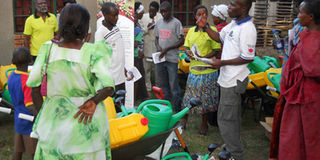Community gardens to promote agriculture

Eddie Mukiibi (right) hands out garden kits to members of a Slow Food community garden in Lwengo District. Photo by Michael J Ssali
Ten thousand community gardens are to be created in Africa this year to promote traditional agriculture. The project is to be implemented by a global anti-hunger organisation, Slow Food, which promotes farming that is based on the people’s culture and knowledge, local terrain, and respect for biodiversity.
A Ugandan agronomist, Edie Mukiibi, who is vice president, Slow Food, will oversee its implementation.
“We do not have a specific time frame but we will keep evaluating the success and expansion of the project every year as African Slow Food leaders together with the international office,” he said. “This project is one of the three main objectives of the Slow Food movement for the next two years. We hope it will run as long as the communities still find it necessary.”
Gain momentum
Mukiibi was instrumental in creating several community gardens in Uganda as well as about a thousand others in 25 countries.
He explained: “We started with one garden and the number kept growing. When it reached 10, we set an objective of 1,000 gardens in 2010. The demand for the gardens in schools and communities has been overwhelming. The Slow Food international congress in 2012 held in Turin, Italy, voted to raise the number to 10,000 gardens.”
Mukiibi will be meeting different communities to ensure that the project gains momentum.
“Being one of those behind this idea, together with colleagues, I have travelled to different African countries to follow up on the project, encouraging and supporting schools, communities and households to promote its objectives,” he added.
Link communities
The project is run through funding from various supporters to finance activities and costs associated with the day-to-day running of the project.
Each garden is budgeted to cost 900 Euros (Shs2.8m), which covers various items including the Garden Startup Kit.
As it is important to share information, the funds cover costs of videos, printed materials and audio messages. It is also used to service web pages and social media which is used to not only share information but link the communities.
A great part of the funding goes to trainings and knowledge exchange.
“At Slow Food we believe in learning across cultures and hence we have these multi-cultural learning exercises, exchanges and workshops organised in different parts of the world at international, national, regional and local levels,” Mukiibi said, adding that though Africa is prone to political conflicts, it will not deter Slow Food from setting up gardens in such countries as South Sudan, Nigeria, Somalia and even the countries affected by the Ebola epidemic.
“Even those countries where there are political and social problems as well as those affected by Ebola have a right to good, clean and fair food for all. Slow Food for Africa works in all these countries and we already have a network in Somalia, Congo, Burkina Faso, Guinea, Sierra Leone and other countries,” he pointed out.
In setting up the gardens, Mukiibi will work with a cross-section of people. Notably, the youth who will play a more important role.
The gardens are considered cross-generational learning experiences, which involve both old and young, men and women.
Learn from elders
The school gardens mainly target school going children but their parents also sometimes join in.
Given that Africa has a significant youth population, a lot of attention is paid to involving more young people in and out of schools.
“While an agronomist at the university, I realised that the future of Africa’s food cannot be by laboratories and offices. It is the Africans who must make decisions about their food and agriculture,” Mukiibi remarked.
“I joined Slow Food with many passionate young people with whom I have created an active network to share knowledge and learn from elders because we, young people, are the future of Africa.”
Setting up the garden
A local community will identify a piece of land for the garden. Where it is extremely hard to get land, roof tops or the side of a footpath may be considered.
The different generations and social groups in the community like schools, villages and associations participate in preparing it. They plant the different local crops, drawing on the experience of older generations, making the most of the energy and creativity of the young people in the community and benefitting from the skills of experts like agricultural extension service providers.
The garden must be suited to its surroundings. Local material will be used to fence it off. Organic manure will be used and natural remedies based on herbs, flowers or ash will be used to combat harmful pests and diseases.
The gardens should also be planted with local fruit and medicinal plants. The gardens will be like open air classrooms where everyone will learn how to produce food and to understand what it takes to come up with native plant varieties, and promoting a healthy and varied diet.




